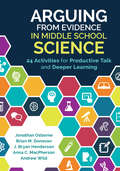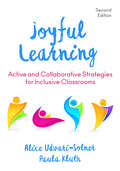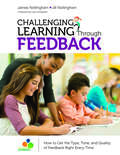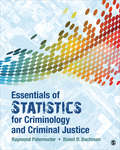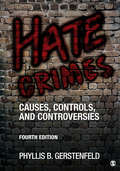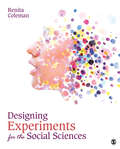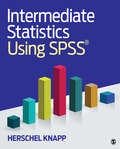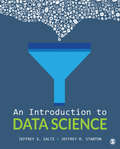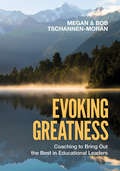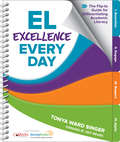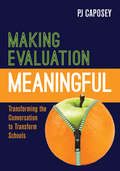- Table View
- List View
Arguing From Evidence in Middle School Science: 24 Activities for Productive Talk and Deeper Learning
by Brian M. Donovan Anna C. MacPherson Andrew J. Wild Jonathan Francis Osborne J. (Joseph) HendersonTeaching your students to think like scientists starts here! If you’ve ever struggled to help students make scientific arguments from evidence, this practical, easy-to-use activity book is for you! Give your students the critical scientific practice today′s science standards require. You’ll discover strategies and activities to effectively engage students in arguments about competing data sets, opposing scientific ideas, applying evidence to support specific claims, and more. 24 ready-to-implement activities drawn from the physical sciences, life sciences, and earth and space sciences help teachers to: Align lessons to the Next Generation Science Standards (NGSS) Engage students in the 8 NGSS science and engineering practices Establish rich, productive classroom discourse Facilitate reading and writing strategies that align to the Common Core State Standards Extend and employ argumentation and modeling strategies Clarify the difference between argumentation and explanation Includes assessment guidance and extension activities. Learn to teach the rational side of science the fun way with this simple and straightforward guide!
Arguing From Evidence in Middle School Science: 24 Activities for Productive Talk and Deeper Learning
by Brian M. Donovan Anna C. MacPherson Andrew J. Wild Jonathan Francis Osborne J. (Joseph) HendersonTeaching your students to think like scientists starts here! If you’ve ever struggled to help students make scientific arguments from evidence, this practical, easy-to-use activity book is for you! Give your students the critical scientific practice today′s science standards require. You’ll discover strategies and activities to effectively engage students in arguments about competing data sets, opposing scientific ideas, applying evidence to support specific claims, and more. 24 ready-to-implement activities drawn from the physical sciences, life sciences, and earth and space sciences help teachers to: Align lessons to the Next Generation Science Standards (NGSS) Engage students in the 8 NGSS science and engineering practices Establish rich, productive classroom discourse Facilitate reading and writing strategies that align to the Common Core State Standards Extend and employ argumentation and modeling strategies Clarify the difference between argumentation and explanation Includes assessment guidance and extension activities. Learn to teach the rational side of science the fun way with this simple and straightforward guide!
Joyful Learning: Active and Collaborative Strategies for Inclusive Classrooms
by Alice Udvari-Solner Paula M. KluthDiscover motivating, personalized learning strategies that all of your students will love! Build an active, responsive, and inclusive classroom where every student benefits. Through step-by-step directions, reproducible handouts, classroom-tested examples, and specific guidelines, teachers and teacher teams will discover 60 activities to help you: Quickly and easily modify and adapt design instruction for diverse learners, including students with cultural, language, learning, physical, or sensory differences Transform lectures and whole-class discussions through dynamic, student-centered learning experiences Immerse students in discussion, debate, creative thinking, questioning, teamwork, and collaborative learning Flexibly co-plan and co-teach with a variety of school professionals The revised edition of this bestselling resource includes step-by-step directions, reproducible handouts, classroom-tested examples, and specific guidelines. Discover quick and easy ways to help all learners participate, contribute, and learn with this unique guide! "This book is a gold mine of strategies to increase engagement, participation, and JOY for all students in inclusive classrooms. The examples and implementation suggestions make is easy for K-12 teachers to select and apply strategies that make learning meaningful and fun." —Barb Gruber, Inclusion Facilitator Maryland Coalition for Inclusive Education "One of the many things I appreciate about this new edition is the range of its examples. Regardless of grade level or subject area, all K-12 teachers will find relevant gems here." —Kelly Chandler-Olcott, Associate Dean for Research Syracuse University
Joyful Learning: Active and Collaborative Strategies for Inclusive Classrooms
by Alice Udvari-Solner Paula M. KluthDiscover motivating, personalized learning strategies that all of your students will love! Build an active, responsive, and inclusive classroom where every student benefits. Through step-by-step directions, reproducible handouts, classroom-tested examples, and specific guidelines, teachers and teacher teams will discover 60 activities to help you: Quickly and easily modify and adapt design instruction for diverse learners, including students with cultural, language, learning, physical, or sensory differences Transform lectures and whole-class discussions through dynamic, student-centered learning experiences Immerse students in discussion, debate, creative thinking, questioning, teamwork, and collaborative learning Flexibly co-plan and co-teach with a variety of school professionals The revised edition of this bestselling resource includes step-by-step directions, reproducible handouts, classroom-tested examples, and specific guidelines. Discover quick and easy ways to help all learners participate, contribute, and learn with this unique guide! "This book is a gold mine of strategies to increase engagement, participation, and JOY for all students in inclusive classrooms. The examples and implementation suggestions make is easy for K-12 teachers to select and apply strategies that make learning meaningful and fun." —Barb Gruber, Inclusion Facilitator Maryland Coalition for Inclusive Education "One of the many things I appreciate about this new edition is the range of its examples. Regardless of grade level or subject area, all K-12 teachers will find relevant gems here." —Kelly Chandler-Olcott, Associate Dean for Research Syracuse University
Challenging Learning Through Feedback: How to Get the Type, Tone and Quality of Feedback Right Every Time (Corwin Teaching Essentials)
by James A. Nottingham Jill NottinghamUsing feedback to enhance learning Feedback has the potential to dramatically improve student learning – if done correctly. In fact, providing high quality feedback is one of the most critical roles of a teacher. But if feedback is not done correctly it can have a minimal – or even negative effect – on learning. Challenging Learning Through Feedback provides educators with the tools they need to establish clear learning intentions and success criteria in order to craft high quality feedback and avoid common feedback mistakes. Readers will learn When feedback is (and isn’t) working How to design feedback so that it answers three essential questions Strategies for crafting clear Learning Intentions and Success Criteria How to teach students to give high quality feedback to themselves and others Written by educational innovators James Nottingham and Jill Nottingham, this book is full of specific examples for educators who want to understand the qualities of excellent feedback and how to craft it. "Feedback – a noun or a verb? A separate practice or an integral part of the learning process? Something we do ‘to students’ or ‘with students’? The Nottinghams sort it all out for us – the ‘what,’ ‘why,’ and ‘how’ of the process and the practice of feedback." Barb Pitchford, Co-author Leading Impact Teams: Building a Culture of Efficacy (2016) "Finally a practical book on feedback for teachers! It is written with the teacher in mind, lesson plan in hand, and relevant to all in education. The perfect school-wide study book!" Lisa Cebelak, Education Consultant Grand Rapids, MI
Challenging Learning Through Feedback: How to Get the Type, Tone and Quality of Feedback Right Every Time (Corwin Teaching Essentials)
by James A. Nottingham Jill NottinghamUsing feedback to enhance learning Feedback has the potential to dramatically improve student learning – if done correctly. In fact, providing high quality feedback is one of the most critical roles of a teacher. But if feedback is not done correctly it can have a minimal – or even negative effect – on learning. Challenging Learning Through Feedback provides educators with the tools they need to establish clear learning intentions and success criteria in order to craft high quality feedback and avoid common feedback mistakes. Readers will learn When feedback is (and isn’t) working How to design feedback so that it answers three essential questions Strategies for crafting clear Learning Intentions and Success Criteria How to teach students to give high quality feedback to themselves and others Written by educational innovators James Nottingham and Jill Nottingham, this book is full of specific examples for educators who want to understand the qualities of excellent feedback and how to craft it. "Feedback – a noun or a verb? A separate practice or an integral part of the learning process? Something we do ‘to students’ or ‘with students’? The Nottinghams sort it all out for us – the ‘what,’ ‘why,’ and ‘how’ of the process and the practice of feedback." Barb Pitchford, Co-author Leading Impact Teams: Building a Culture of Efficacy (2016) "Finally a practical book on feedback for teachers! It is written with the teacher in mind, lesson plan in hand, and relevant to all in education. The perfect school-wide study book!" Lisa Cebelak, Education Consultant Grand Rapids, MI
Challenging Learning Through Questioning: Facilitating the Process of Effective Learning (Corwin Teaching Essentials)
by Martin RentonBetter questioning for better learning Questioning is a process that sparks discussion and encourages deeper thinking. Effective questioning builds on students’ natural curiosity, moving them out of their comfort zone and into the learning zone in a purposeful, accessible way. It also models the process of good thinking and fosters a culture of high expectations. Like any skill, questioning takes practice. With this insightful guide, you’ll reframe your thinking and fine-tune the three essential questioning skills—know your intent, plan your responses, and stay purposefully silent—to elicit noticeably improved responses from students. Features include · Questioning sequences that work in any discipline · Techniques for deepening learning through questioning · Organizational strategies for pair, small-group, and whole-class dialogues · Best practices for balancing questioning, thinking tools, and strategic silences · Exercises, activities, and review and reflection sections High-quality questioning supports a culture in which students are not only challenged, but expect to be challenged, and where they flourish intellectually. Through your questioning, you’ll give them the tools they need to become thoughtful, confident, and independent learners.
Challenging Learning Through Questioning: Facilitating the Process of Effective Learning (Corwin Teaching Essentials)
by Martin RentonBetter questioning for better learning Questioning is a process that sparks discussion and encourages deeper thinking. Effective questioning builds on students’ natural curiosity, moving them out of their comfort zone and into the learning zone in a purposeful, accessible way. It also models the process of good thinking and fosters a culture of high expectations. Like any skill, questioning takes practice. With this insightful guide, you’ll reframe your thinking and fine-tune the three essential questioning skills—know your intent, plan your responses, and stay purposefully silent—to elicit noticeably improved responses from students. Features include · Questioning sequences that work in any discipline · Techniques for deepening learning through questioning · Organizational strategies for pair, small-group, and whole-class dialogues · Best practices for balancing questioning, thinking tools, and strategic silences · Exercises, activities, and review and reflection sections High-quality questioning supports a culture in which students are not only challenged, but expect to be challenged, and where they flourish intellectually. Through your questioning, you’ll give them the tools they need to become thoughtful, confident, and independent learners.
Challenging Mindset: Why a Growth Mindset Makes a Difference in Learning – and What to Do When It Doesn’t (Corwin Teaching Essentials)
by James A. Nottingham Bosse Larsson"James Nottingham and Bosse Larsson offer an important and useful new addition to the ongoing conversation about mindset first introduced by Carol Dweck. Too often, theories such as mindset get reduced down to the simplest dichotomies and ideologies. Here, Nottingham and Larsson challenge our own mindset about the very idea of mindset theory itself, showing us what is possible if we really understand the theory and use it to challenge ourselves and our students." Jim Burke, Teacher, Burlingame High School, and Author, Common Core Companion Series This book answers key questions about Carol Dweck’s theory of Mindset – What is a ‘growth mindset’ and what difference can it make? Why are growth mindset interventions not working in schools (yet) and what can be done to change this? What is a ‘failure mindset’ and why is it more influential than an adult’s fixed or growth mindset? Drawing on their experiences of presenting alongside Carol Dweck on many occasions, James Nottingham and Bosse Larsson tackle head-on these questions with research-backed clarity, and share proven strategies for mindset success. Mindset doesn’t matter when things are easy; it is only when faced with challenges that working from a growth mindset influences learning. Highlights of the book include: Comments and insights from Carol Dweck to enhance your understanding of her important work A detailed and nuanced examination of how mindset works and what you can do to make it more effective for your students An exploration of the relationship between mindset and grades Strategies to encourage a growth mindset during moments of challenge Comprehensive lesson ideas for teaching students about mindset Why praising ‘effort’ can be powerful but also problematic, with an identification of what type of praise is best Examples of how to make the most of mindset theory and practice Everyone has a mindset that shapes their personality, motivation and development. This book shows you how to create the right conditions for a growth mindset to flourish in your classroom, your school, your staff and your students.
Challenging Mindset: Why a Growth Mindset Makes a Difference in Learning – and What to Do When It Doesn’t (Corwin Teaching Essentials)
by James A. Nottingham Bosse Larsson"James Nottingham and Bosse Larsson offer an important and useful new addition to the ongoing conversation about mindset first introduced by Carol Dweck. Too often, theories such as mindset get reduced down to the simplest dichotomies and ideologies. Here, Nottingham and Larsson challenge our own mindset about the very idea of mindset theory itself, showing us what is possible if we really understand the theory and use it to challenge ourselves and our students." Jim Burke, Teacher, Burlingame High School, and Author, Common Core Companion Series This book answers key questions about Carol Dweck’s theory of Mindset – What is a ‘growth mindset’ and what difference can it make? Why are growth mindset interventions not working in schools (yet) and what can be done to change this? What is a ‘failure mindset’ and why is it more influential than an adult’s fixed or growth mindset? Drawing on their experiences of presenting alongside Carol Dweck on many occasions, James Nottingham and Bosse Larsson tackle head-on these questions with research-backed clarity, and share proven strategies for mindset success. Mindset doesn’t matter when things are easy; it is only when faced with challenges that working from a growth mindset influences learning. Highlights of the book include: Comments and insights from Carol Dweck to enhance your understanding of her important work A detailed and nuanced examination of how mindset works and what you can do to make it more effective for your students An exploration of the relationship between mindset and grades Strategies to encourage a growth mindset during moments of challenge Comprehensive lesson ideas for teaching students about mindset Why praising ‘effort’ can be powerful but also problematic, with an identification of what type of praise is best Examples of how to make the most of mindset theory and practice Everyone has a mindset that shapes their personality, motivation and development. This book shows you how to create the right conditions for a growth mindset to flourish in your classroom, your school, your staff and your students.
Essentials of Statistics for Criminology and Criminal Justice: Paternoster: Essentials Of Statistics For Criminology And Criminal Justice + Spss 23. 0
by Raymond Paternoster Ronet D. BachmanEssentials of Statistics for Criminology and Criminal Justice helps students understand the vital role that research and statistics play in the study of criminology and criminal justice by showing them how to conduct and interpret statistics in real-world settings with a step-by-step approach to solving problems. This practical, applied approach offers students the fundamentals of descriptive and inferential statistics in a concise and easy-to-understand format—avoiding complicated proofs and discussions of statistical theory. The examples and case studies provide relevant examples for criminology and criminal justice students, and deal with contemporary issues related to crime, corrections, police, and the judicial system. Students will not only learn about the "how to" in statistics, but they will also recognize its importance in today’s criminal justice system.
Essentials of Statistics for Criminology and Criminal Justice: Paternoster: Essentials Of Statistics For Criminology And Criminal Justice + Spss 23. 0
by Raymond Paternoster Ronet D. BachmanEssentials of Statistics for Criminology and Criminal Justice helps students understand the vital role that research and statistics play in the study of criminology and criminal justice by showing them how to conduct and interpret statistics in real-world settings with a step-by-step approach to solving problems. This practical, applied approach offers students the fundamentals of descriptive and inferential statistics in a concise and easy-to-understand format—avoiding complicated proofs and discussions of statistical theory. The examples and case studies provide relevant examples for criminology and criminal justice students, and deal with contemporary issues related to crime, corrections, police, and the judicial system. Students will not only learn about the "how to" in statistics, but they will also recognize its importance in today’s criminal justice system.
Hate Crimes: Causes, Controls, and Controversies
by Phyllis B. GerstenfeldThe Fourth Edition of Hate Crimes: Causes, Controls, and Controversies takes a multidisciplinary approach that allows students to explore a broad scope of hate crimes. Drawing on recent developments, topics, and current research, this book examines the issues that foster hate crimes while demonstrating how these criminal acts impact individuals, as well as communities. Students are introduced to the issue through first-person vignettes—offering a more personalized account of both victims and perpetrators of hate crimes. Packed with the latest court cases, research, and statistics from a variety of scholarly sources, the Fourth Edition is one of the most comprehensive and accessible textbooks in the field.
Hate Crimes: Causes, Controls, and Controversies
by Phyllis B. GerstenfeldThe Fourth Edition of Hate Crimes: Causes, Controls, and Controversies takes a multidisciplinary approach that allows students to explore a broad scope of hate crimes. Drawing on recent developments, topics, and current research, this book examines the issues that foster hate crimes while demonstrating how these criminal acts impact individuals, as well as communities. Students are introduced to the issue through first-person vignettes—offering a more personalized account of both victims and perpetrators of hate crimes. Packed with the latest court cases, research, and statistics from a variety of scholarly sources, the Fourth Edition is one of the most comprehensive and accessible textbooks in the field.
Designing Experiments for the Social Sciences: How to Plan, Create, and Execute Research Using Experiments
by Renita Coleman"This book is a must for learning about the experimental design–from forming a research question to interpreting the results this text covers it all." –Sarah El Sayed, University of Texas at Arlington Designing Experiments for the Social Sciences: How to Plan, Create, and Execute Research Using Experiments is a practical, applied text for courses in experimental design. The text assumes that students have just a basic knowledge of the scientific method, and no statistics background is required. With its focus on how to effectively design experiments, rather than how to analyze them, the book concentrates on the stage where researchers are making decisions about procedural aspects of the experiment before interventions and treatments are given. Renita Coleman walks readers step-by-step on how to plan and execute experiments from the beginning by discussing choosing and collecting a sample, creating the stimuli and questionnaire, doing a manipulation check or pre-test, analyzing the data, and understanding and interpreting the results. Guidelines for deciding which elements are best used in the creation of a particular kind of experiment are also given. This title offers rich pedagogy, ethical considerations, and examples pertinent to all social science disciplines.
Designing Experiments for the Social Sciences: How to Plan, Create, and Execute Research Using Experiments
by Renita Coleman"This book is a must for learning about the experimental design–from forming a research question to interpreting the results this text covers it all." –Sarah El Sayed, University of Texas at Arlington Designing Experiments for the Social Sciences: How to Plan, Create, and Execute Research Using Experiments is a practical, applied text for courses in experimental design. The text assumes that students have just a basic knowledge of the scientific method, and no statistics background is required. With its focus on how to effectively design experiments, rather than how to analyze them, the book concentrates on the stage where researchers are making decisions about procedural aspects of the experiment before interventions and treatments are given. Renita Coleman walks readers step-by-step on how to plan and execute experiments from the beginning by discussing choosing and collecting a sample, creating the stimuli and questionnaire, doing a manipulation check or pre-test, analyzing the data, and understanding and interpreting the results. Guidelines for deciding which elements are best used in the creation of a particular kind of experiment are also given. This title offers rich pedagogy, ethical considerations, and examples pertinent to all social science disciplines.
Intermediate Statistics Using SPSS
by Herschel KnappWhat statistical test should I use for this kind of data? How do I set up the data? What parameters should I specify when ordering the test? How do I interpret the results? Herschel Knapp′s friendly and approachable guide to real-world statistics answers these questions. Intermediate Statistics Using SPSS is not about abstract statistical theory or the derivation or memorization of statistical formulas–it is about applied statistics. With jargon-free language and clear processing instructions, this text covers the most common statistical functions–from basic to more advanced. Practical exercises at the conclusion of each chapter offer students an opportunity to process viable data sets, write cohesive abstracts in APA style, and build a thorough comprehension of the statistical process. Students will learn by doing with this truly practical approach to statistics.
Intermediate Statistics Using SPSS
by Herschel KnappWhat statistical test should I use for this kind of data? How do I set up the data? What parameters should I specify when ordering the test? How do I interpret the results? Herschel Knapp′s friendly and approachable guide to real-world statistics answers these questions. Intermediate Statistics Using SPSS is not about abstract statistical theory or the derivation or memorization of statistical formulas–it is about applied statistics. With jargon-free language and clear processing instructions, this text covers the most common statistical functions–from basic to more advanced. Practical exercises at the conclusion of each chapter offer students an opportunity to process viable data sets, write cohesive abstracts in APA style, and build a thorough comprehension of the statistical process. Students will learn by doing with this truly practical approach to statistics.
An Introduction to Data Science
by Jeffrey S. Saltz Jeffrey Morgan StantonAn Introduction to Data Science is an easy-to-read, gentle introduction for advanced undergraduate, certificate, and graduate students coming from a wide range of backgrounds into the world of data science. After introducing the basic concepts of data science, the book builds on these foundations to explain data science techniques using the R programming language and RStudio® from the ground up. Short chapters allow instructors to group concepts together for a semester course and provide students with manageable amounts of information for each concept. By taking students systematically through the R programming environment, the book takes the fear out of data science and familiarizes students with the environment so they can be successful when performing advanced functions. The authors cover statistics from a conceptual standpoint, focusing on how to use and interpret statistics, rather than the math behind the statistics. This text then demonstrates how to use data effectively and efficiently to construct models, predict outcomes, visualize data, and make decisions. Accompanying digital resources provide code and datasets for instructors and learners to perform a wide range of data science tasks.
An Introduction to Data Science
by Jeffrey S. Saltz Jeffrey Morgan StantonAn Introduction to Data Science is an easy-to-read, gentle introduction for advanced undergraduate, certificate, and graduate students coming from a wide range of backgrounds into the world of data science. After introducing the basic concepts of data science, the book builds on these foundations to explain data science techniques using the R programming language and RStudio® from the ground up. Short chapters allow instructors to group concepts together for a semester course and provide students with manageable amounts of information for each concept. By taking students systematically through the R programming environment, the book takes the fear out of data science and familiarizes students with the environment so they can be successful when performing advanced functions. The authors cover statistics from a conceptual standpoint, focusing on how to use and interpret statistics, rather than the math behind the statistics. This text then demonstrates how to use data effectively and efficiently to construct models, predict outcomes, visualize data, and make decisions. Accompanying digital resources provide code and datasets for instructors and learners to perform a wide range of data science tasks.
Evoking Greatness: Coaching to Bring Out the Best in Educational Leaders
by Megan Tschannen-Moran Robert K. Tschannen-MoranDiscover coaching strategies to inspire greatness in any educational leader! Centered on evocative coaching, a person-centered, no-fault, strengths-based coaching model, this book will equip those who coach educational leaders to host engaging and productive coaching conversations. Coaches who read this book will learn to LEAD: Listen, Empathize, Appreciate, and Design, as well as to discover: Guidance for coaching leaders with specific questions, things to listen for, and ways to generate new ideas and motivation Research-based theories that ground the strategies presented in each chapter Real-life vignettes that illustrate the evocative coaching model in action Reflection and discussion questions, templates, and other materials to scaffold the learning of coaches as they innovate their way forward "Leadership coaching has arisen as a powerful intervention to support the professional learning of leaders. In this book Megan and Bob Tschannen-Moran invite us to see into their world of evocative coaching. They demonstrate how coaching conversations can lead to a flow of energy, enthusiasm and possibilities that bring out movement in people. The authors combine their theoretical knowledge with their experience as coaches, exemplified in wonderful stories and practical examples. As a coach myself I could not stop reading because I was so curious about the next chapter. The book is a great example of how high quality professional learning can enhance educational leaders′ daily leadership practice." —Marit Aas, Associate Professor University of Oslo, Oslo, Norway
Evoking Greatness: Coaching to Bring Out the Best in Educational Leaders
by Megan Tschannen-Moran Robert K. Tschannen-MoranDiscover coaching strategies to inspire greatness in any educational leader! Centered on evocative coaching, a person-centered, no-fault, strengths-based coaching model, this book will equip those who coach educational leaders to host engaging and productive coaching conversations. Coaches who read this book will learn to LEAD: Listen, Empathize, Appreciate, and Design, as well as to discover: Guidance for coaching leaders with specific questions, things to listen for, and ways to generate new ideas and motivation Research-based theories that ground the strategies presented in each chapter Real-life vignettes that illustrate the evocative coaching model in action Reflection and discussion questions, templates, and other materials to scaffold the learning of coaches as they innovate their way forward "Leadership coaching has arisen as a powerful intervention to support the professional learning of leaders. In this book Megan and Bob Tschannen-Moran invite us to see into their world of evocative coaching. They demonstrate how coaching conversations can lead to a flow of energy, enthusiasm and possibilities that bring out movement in people. The authors combine their theoretical knowledge with their experience as coaches, exemplified in wonderful stories and practical examples. As a coach myself I could not stop reading because I was so curious about the next chapter. The book is a great example of how high quality professional learning can enhance educational leaders′ daily leadership practice." —Marit Aas, Associate Professor University of Oslo, Oslo, Norway
EL Excellence Every Day: The Flip-to Guide for Differentiating Academic Literacy
by Tonya W. SingerTake the Flip-to Book Tour! You have to see this book to believe this book. And once you use this book it will quickly become your most treasured teaching resource. What exactly is so remarkable? All of the best teaching tools in language and literacy are at your fingertips! Just flip to that strategy you want to learn or that literacy goal you want to reach for a wealth of ready-to-use resources to actively engage learners, build academic language, and strategically support literacy instruction. Much more than a resource for EL specialists, EL Excellence Every Day is written for every teacher, with a singular focus on improving the ways we all differentiate literacy instruction. Busy teachers especially will appreciate: Over 85 flip-to strategies that help you engage and support all learners 200+ prompts and linguistic scaffolds to facilitate academic conversations connected to specific literacy goals Lesson-ready resources for essential literacy goals: anticipate before reading, read to understand, read to analyze and infer, and write with text evidence Formative assessment tasks and if/then charts for personalizing teaching to every student Differentiation guides that demonstrate how to adjust supports across EL proficiency levels Intuitive, color-coded design so you can find what you need, when you need it No one lesson or strategy is ever the perfect solution for every student. No one student learns in the same way. If there’s one universal truth in teaching it’s that every child is unique. Devour this book and soon enough you’ll provide the excellent literacy instruction each and every student deserves each and every day. "We need resources that clearly and quickly help us to meet diverse instructional needs every day in every classroom. Tonya Ward Singer’s EL Excellence Every Day: The Flip-to Guide for Differentiating Academic Literacy is such a resource." --JEFF ZWIERS, from the foreword
EL Excellence Every Day: The Flip-to Guide for Differentiating Academic Literacy
by Tonya W. SingerTake the Flip-to Book Tour! You have to see this book to believe this book. And once you use this book it will quickly become your most treasured teaching resource. What exactly is so remarkable? All of the best teaching tools in language and literacy are at your fingertips! Just flip to that strategy you want to learn or that literacy goal you want to reach for a wealth of ready-to-use resources to actively engage learners, build academic language, and strategically support literacy instruction. Much more than a resource for EL specialists, EL Excellence Every Day is written for every teacher, with a singular focus on improving the ways we all differentiate literacy instruction. Busy teachers especially will appreciate: Over 85 flip-to strategies that help you engage and support all learners 200+ prompts and linguistic scaffolds to facilitate academic conversations connected to specific literacy goals Lesson-ready resources for essential literacy goals: anticipate before reading, read to understand, read to analyze and infer, and write with text evidence Formative assessment tasks and if/then charts for personalizing teaching to every student Differentiation guides that demonstrate how to adjust supports across EL proficiency levels Intuitive, color-coded design so you can find what you need, when you need it No one lesson or strategy is ever the perfect solution for every student. No one student learns in the same way. If there’s one universal truth in teaching it’s that every child is unique. Devour this book and soon enough you’ll provide the excellent literacy instruction each and every student deserves each and every day. "We need resources that clearly and quickly help us to meet diverse instructional needs every day in every classroom. Tonya Ward Singer’s EL Excellence Every Day: The Flip-to Guide for Differentiating Academic Literacy is such a resource." --JEFF ZWIERS, from the foreword
Making Evaluation Meaningful: Transforming the Conversation to Transform Schools
by P J CaposeyRe-evaluate your perspective on teacher evaluation to truly transform school performance! The tools, strategies, and reflections in this book provide realistic solutions to the problem faced by many schools: meaningless evaluation. A considerable amount of time, energy, and money is spent on the teacher evaluation process, yet the question remains whether it is truly transforming the learning of teachers and, therefore, students. This practical guide shows how evaluation can become the tie that binds all school improvement activities together to: Bring clarity and purpose to all educators making their roles more effective Improve teacher practice since they receive better support Increase student achievement and overall school culture "For years, building leaders have been agonizing over teacher evaluations, pouring countless hours into a practice that consistently fails to produce the desired result; more meaningful conversations that produce improved quality instructional practices and increases in student achievement. In his book, Making Evaluation Meaningful, PJ Caposey shares a step by step framework filled with quick & easy to follow "Tips for Tomorrow," as well as detailed examples to help you shift your mindset and behave yourself to a more effective instructional leader. This book will leave you questioning your own evaluation system while at the same time inspiring you to re-commit the time and resources needed to help grow and develop your teachers." —Jimmy Casas, Principal and CEO " PJ Caposey, through a practitioner lens, has developed an incredible guide that not only helps to demystify the evaluation process, but also provide ready-to- use strategies to ensure reflection and growth are the result. In the end evaluation must be meaningful for both parties. This book will help get you there." —Eric Sheninger, Author/Consultant, Senior Fellow/Thought Leader "PJ Caposey has developed a great resource on teacher evaluation that actually provides realistic, encouraging, and supportive guidance instead of an arbitrary checklist!" —Larry Ferlazzo, Teacher, Author and Education Week Teacher advice blogger Luther Burbank High School, Sacramento, CA
